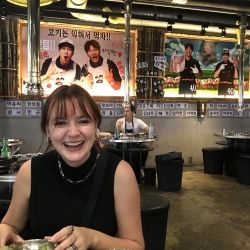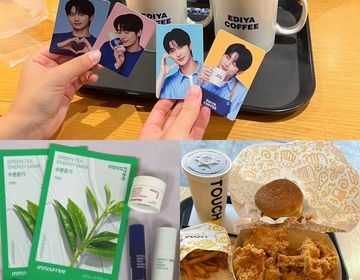Dear Korea and Your Health-Care System, Thanks for Putting my Shoulder Back in its Socket<3
Dear Korea and Your Health-Care System, Thanks for Putting my Shoulder Back in its Socket<3
Six months ago I had the unfortunate chance to experience what it feels like to dislocate a shoulder—and let me tell you it does not feel great. My short skateboarding career not only led to an unexpected injury, but also sent me reeling straight into the ER for the first time. Laying in the Portland Oregon Emergency Room bed, wearing only a sports bra and my bright green and groovy ‘skater’ pants, I was informed by a doctor that I would have to be given both ketamine and morphine in a liquid IV in order to pop my shoulder back in place. In shock and pain I uncertainly agreed to take these drugs, and I quickly ascended into an unfortunate and intense high that lasted ten minutes—just enough time for the nurse to pop my shoulder back into its rightful place and be on her merry way. Evidence of the drug's effects could be highlighted by the fact that I whispered into the nurse's ear as she re-adjusted my arm ‘you have a very soothing voice’. Only after I departed from the hospital, happily in much less pain than before, did I ponder the insanity that was the extreme amount of drugs permitted into my body. No one during this process asked me if I have a history of addiction or mental health disorders, they just gave me the drugs. I wondered briefly if these loose regulations on opioid use in medical facilities had any influence on America's opioid overdose epidemic that has been sweeping the country since 1999, and if regulations for these drugs were so loose under medical instances in other countries. Just to illustrate the severity of the US’s drug crisis, it can be noted that opioid-related deaths In the US experience a 6% increase between 2018 and 2019 and over 70% of the 70,630 recorded American deaths in 2019 involved an opioid. (https://www.cdc.gov/opioids/basics/epidemic.html). Nevertheless, I did not think that I would ever have the ‘opportunity’ to encounter a different country’s medical system and see if drug regulation and medical procedures were done differently there than in the US.
Flash forward to six months later. I am in my dorm room in Seoul, South Korea, fresh out of quarantine and goofing around with my friends. We are discussing how my shoulders look a bit uneven since the ‘accident’ and after a quick google search, I decided to try out a couple of shoulder strengthening exercises Web. MD recommends for shoulder equilibrium improvement. Note for next time; I will not be randomly following online shoulder exercises. At the moment I honestly felt that my shoulder was completely healed and my injured days were well behind me, but alas I was far from correct. As I lifted my water bottle up and down in the form of a make-shift weight, I felt the familiar warm and painful sensation of my shoulder dislocating. Suddenly I was in a lot of pain, and I turned to my friends in disdain to tell them in the calmest way I would muster that my shoulder did indeed just dislocate and I needed to go to the ER. Frazzled, they scrambled around grabbing passports, IDs and wallets as I sat in shock and pain on the bed. We descended to the dorm lobby and my friends worried with the front desk staff to find a taxi. It is probably important to note that it was monsoon season in Seoul, and rain was pouring down in heavy, warm drops making it harder for taxis to navigate the city. Eventually, we make it into a taxi, and after an excruciatingly bumpy and tearful ride, arrive at the emergency room. At this point, I am in a pretty awful state. I am both scared to be dealing with this emergency in a foreign country where I cannot communicate with that staff about my desire not to be injected with intense drugs like I was in the United States, and I am on the flip side also extremely desperate for pain relief. Eventually, I get my program director on the phone and she agrees to help translate and catch a taxi to the ER (shout out to Tina you saved the day). This, along with a tearful call to my parents in the states, partially calmed me down. After an X-Ray and some kind words from the Korean woman next to me in the waiting room, I am led to a hospital bed and hooked up to an IV. I repeatedly tell them that I don’t want Morphine and Ketamine again and eventually I call my contact so she can translate just to be sure. They assure me that they won’t use those drugs and tell me that I will instead be given just a pain killer and put to sleep. Although I am nervous, the need for pain relief is greater and I let them proceed. As I sit watching the IV drip crystal clear pain medicine into my arm, I subconsciously prepare for another scary out-of-body high that never comes. I focus on my breathing and the doctor pops my shoulder back into place before I have the chance to fall asleep. Overwhelmingly relieved, and in significantly less pain, I say thank you to the doctor and nurses and apologize for acting so frightened. They reply in a polite and efficient manner and let me leave. I take the taxi back, tired and relieved, disbelieving that this all happened less than one week into my exchange. Armed with a new motivation to learn Korean in order to better navigate emergency situations, I compare my two ER trips, one in Korea and one in the US. My experience in the US was expensive, and not fully covered by my insurance. Additionally I had to wait about three hours more in the US than in Korea. In Seoul, although the language barrier made things more difficult and scary, I spent less money (and I even got a student discount!). One of the most significant differences I noticed was that in the US they used much harder drugs in order to pop my shoulder back in place, and did not seem to have much of a concern about this. In Korea, at least from my experience, drug use seems much more regulated and they tend to use the least amount possible while still working to provide the appropriate amount of pain relief.
Looking back I learned a lot from this experience and have a new first-hand appreciation for the Korean healthcare system. Going forward I hope to keep my shoulder safe from harm, and never have to rush to another ER again. But the more you know, you know, right?
That's all for now,
-From the silly American with an arm sling looking lost on the subway
Related Posts
Eating Away Homesickness
Even though it’s my second time living abroad—specifically in South Korea—that doesn’t make me immune to homesickness. Honestly, it sneaks up on you in the most unexpected ways. Sometimes, it’s... keep reading
K-Pop Stan’s Guide to South Korea: 5 Must-Do Activities While Studying Abroad
By: Jacqueline Lee South Korea is the place to be as a kpop stan, so here are 5 activity ideas that you must do during your time abroad! 1. Collect... keep reading



